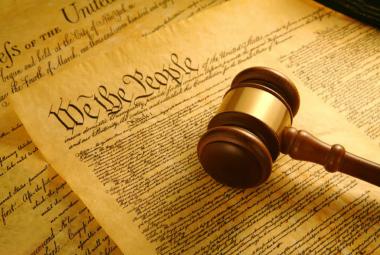There is widespread recognition of the overwhelming problems we face, and there is a mounting realization of the only way out: America must decisively change course, and it must do so now.
We have come to a time of decision. For far too long, the federal government has been on a binge of spending, taxing, and borrowing. It is bloated and vastly overextended, and its unsustainable promises now feed escalating debts that will cripple our economy, undermine our prosperity, and lead to fiscal insolvency.
At the same time, our political leaders defer our nation’s security in a hostile and unstable world, neglecting their obligation to provide for the common defense and protect America’s independence.
More than ever, the federal government operates far beyond its means and outside of its proper constitutional bounds, seemingly oblivious of its core functions. Endless rules and regulations touch every aspect of our daily life.
The United States is on the verge of becoming a country in decline—economically stagnant and debt-bound, heavily regulated and bureaucratic, unsure of its purpose and unconcerned about its freedom.
Are we at the end of the great American experiment in self-government?
This fate does not have to be our future. We can get spending under control, balance the budget, and shrink our debt—without raising taxes. We can assure America’s security, uphold the rule of law, and advance the cause of liberty in the world. We can reduce the size and scope of government and unleash the engines of economic productivity and the institutions of cultural renewal.
All of this is possible—but only if we take decisive action to fundamentally change our country’s course and set America once again on the principled path of liberty, opportunity, and constitutional self-government.
An Exceptional Nation
Throughout history, as in many other parts of the world today, political rule was the privilege of the strongest or the most powerful. Property was the possession of kings, barons, and lords. Because wealth remained fixed in the hands of a very few, there was widespread poverty. Each was born to his or her destiny, and almost all were subject to someone else.
America is different. This nation is uniquely dedicated to the universal principles of human liberty: that all are fundamentally equal and equally endowed with unalienable rights to life, liberty, and the pursuit of happiness. Our government exists to secure these God-given rights, deriving its just powers from the consent of the governed. Our Constitution limits the power of government under the rule of law, creating a vigorous framework for expanding economic opportunity, protecting national independence, and securing liberty and justice for all.
These principles still define America as a nation and as a people. They explain why Americans look fondly to their nation’s origins and remain fiercely patriotic, vigilantly assert their political rights and fulfill their civic responsibilities, constantly strive to live up to America’s highest purposes and remain convinced of the special meaning of their country and its role in the world. It is why friends of freedom the world over look to the United States as an ally against tyrants and a powerful beacon for all of those who strive for liberty.
The American Dream
What matters in America is not where you come from but where you are going. That’s because America’s exceptional principles of liberty give rise to another characteristic unique to this country. We call it the American Dream. That Americans are fundamentally equal and self-governing citizens, and that the United States government is limited to certain core functions, means that we have the liberty and opportunity to live our lives, control our fate, and pursue our happiness.
In the hands of the American people, the principles proclaimed in the Declaration of Independence and promulgated in the United States Constitution have created a nation unlike any other in history. Its economy produces almost a quarter of the world’s wealth, and its military forces remain the most powerful on the globe. The institutions of civil society—family, church, school, and private associations—thrive in America, forming an independent people that are among the most hard-working, church-going, generous, and forward-looking in the world.
The principle that each has a right to the rewards of his own labor—the promise that you can keep what you earn and that what you save and acquire is your property—forms a dynamic society in which every member can work hard, pursue opportunity, and advance in life based on individual talent and ability. In America, earned success corresponds to merit and industriousness rather than to aristocratic privilege and inheritance.
The monumental achievement of this great country is that it makes comfort and general affluence, safety and security, self-government and the blessings of liberty—all traditionally the province of the privileged class—available to the whole of society. It is the potent combination of political liberty under the rule of law, the endless creativity of the marketplace, and the enduring moral character of the American people that assures opportunity for all and fuels the unlimited promises of America.
A Failed Social Experiment
About a hundred years ago, there arose a different dream: that a better society could be engineered by government.
Early progressive reformers were convinced that the American Founders were wrong about man and the necessity of limited government. Instead, they believed that government could reshape society and rid it of the diversities and inequalities that had been unleashed by individual liberty, the ourishing of free enterprise, and the resulting growth of commerce and business. A more activist government, built on evolving rights and a “living” Constitution, would redistribute wealth and level out differences in society through taxation, regulation, and social-welfare programs, all centrally administered by the federal government.
While the new construct was designed during the Progressive Era, it began to take its current form under the New Deal. In order to “assure us equality in the pursuit of happiness,” Franklin D. Roosevelt proposed a Second Bill of Rights, guaranteeing to all Americans a useful job, a living wage, adequate health care, a good education, decent housing, and retirement security. Lyndon Johnson’s Great Society radicalized the argument by asserting that the purpose of government is the assurance of equal outcomes—“not just equality as a right and a theory,” as Johnson once put it, “but equality as a fact and equality as a result.” By creating a truly national bureaucracy of open-ended programs in housing, education, the environment, urban renewal, and even the arts and humanities—not to mention its “War on Poverty”—the Great Society and its progeny in both political parties effected the greatest expansion and centralization of government in American history. And so was born the modern, ever-growing welfare state.
The current Administration under President Barack Obama has launched a new era of liberal reform and revived the old statist model: the transformation of a Troubled Asset Relief Program into a government slush fund to bail out banks and car companies, a massive “stimulus” bill based on the discredited theory that government spending rather than private markets creates economic growth, the most significant expansion of financial regulations since the New Deal, and the creation of an extensive new entitlement program that regulates the entire health care sector. All is to be solved by government through more government.
The Patient Protection and Affordable Care Act—better known as Obamacare—is the centerpiece of this agenda. Massive regulatory authority over one-sixth of the American economy will be transferred to a collection of over 150 federal agencies, bureaus, and commissions along with an unprecedented delegation of power to the Secretary of Health and Human Services. Nothing will be allowed outside of the new regulatory framework—no independent state programs, no individuals or businesses permitted not to participate, no true private market alternatives. The requirement for individuals to buy insurance is both unprecedented and unconstitutional: If government can regulate inactivity, it can do anything.
In this world, a new governing class of experts and political elites insists on enforcing their views of political and economic “fairness” rather than letting us govern ourselves under the rule of law, seizing the opportunities of free enterprise and shaped by a nourishing civil society. Such limitless authority leads inevitably to bureaucratic favoritism, inequalities based on special interests and undue political influence, and the crony corruption of picking winners and losers.
Shattered Dreams, Broken Promises
Despite its good intentions, liberalism’s grand experiment threatens to turn America into a very different country, more like the failing states of old Europe.
The costs and burdens of our current trajectory are staggering:
- Government spending is out of control. Annual federal spending has increased by 289 percent since 1970 (after adjusting for inflation), nearly 12 times faster than median household income. Total annual federal spending did not reach $1 trillion until 1973 but exceeded $2 trillion less than 20 years later and first topped $3 trillion in 2008. Total federal spending in the United States now exceeds 24 percent of the economy.
- Dependence on government is growing rapidly. More than 70 percent of federal spending goes to dependence programs. More than 67.3 million Americans—approaching a quarter of our fellow citizens—now rely on assistance from the federal government for housing, food, income, health and retirement support, or other assistance once considered to be the responsibility of individuals, families, neighborhoods, churches, and other civil society institutions. Dependence on government has increased 23 percent since 2008.
- Liberalism’s promises are unsustainable. Over the next 25 years, more than 77 million baby boomers—the largest generational retirement in world history—will begin collecting Social Security checks, drawing Medicare benefits, and relying on long-term care under Medicaid. Now more than half of all federal program spending, the cost of guaranteed entitlements is expected to nearly double over the next decade. Without major reforms, entitlement spending will consume all federal tax revenues by 2045.
- America faces a debt crisis. Over the next 10 years, publicly held debt will exceed the size of our economy, and by 2036, it will be nearly twice the size of our economy. This is before the long-term costs of entitlements (like Medicare, Medicaid, or Social Security) are added to the ledger.
Changing America’s Course
This is not the time for tinkering or for timidity. We must not be distracted by the political skirmishes of the moment. We need a fundamental correction of our nation’s potentially fatal path.
America urgently needs clear ideas, honest answers, and bold reforms that meet the demands of the moment and address the magnitude of the challenges before us. Such actions—and only such actions—will bring the new era of prosperity, security, and self-government that is required to save our country.
© 2012 The Heritage Foundation. Used by permission. Excerpted from the booklet, Changing America’s Course: What’s at Stake in 2012 by Matthew Spalding; heritage.org






